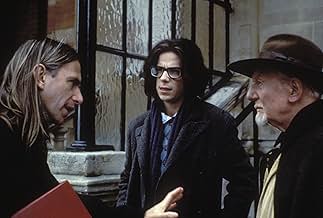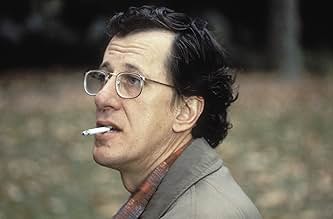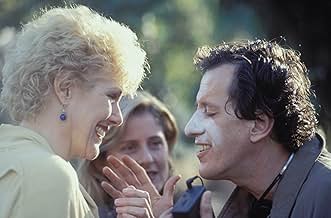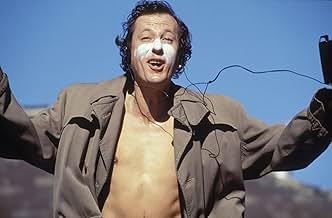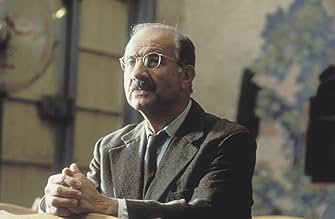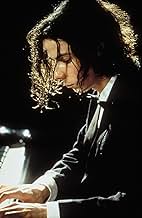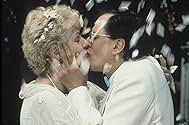Shine
- 1996
- Tous publics
- 1h 45min
NOTE IMDb
7,6/10
58 k
MA NOTE
Le pianiste David Helfgott, poussé à bout par son père et ses professeurs, fait une dépression nerveuse. Des années plus tard, il revient au piano, salué par le public, pour ne pas dire par ... Tout lireLe pianiste David Helfgott, poussé à bout par son père et ses professeurs, fait une dépression nerveuse. Des années plus tard, il revient au piano, salué par le public, pour ne pas dire par la critique.Le pianiste David Helfgott, poussé à bout par son père et ses professeurs, fait une dépression nerveuse. Des années plus tard, il revient au piano, salué par le public, pour ne pas dire par la critique.
- Réalisation
- Scénario
- Casting principal
- Récompensé par 1 Oscar
- 46 victoires et 52 nominations au total
Avis à la une
This is a good film in every sense but will mean most to fathers with strong views :).
The story of a brilliant young pianist whose relationship with his father drives him to some sort of mental illness. Watchable, absorbing, brilliantly edited, deeply seriously moving, one of the rare films that pays attention to incidental sound. Wonderful direction and acting. This is a seriously good film.
The story of a brilliant young pianist whose relationship with his father drives him to some sort of mental illness. Watchable, absorbing, brilliantly edited, deeply seriously moving, one of the rare films that pays attention to incidental sound. Wonderful direction and acting. This is a seriously good film.
When I originally saw this film in the mid-90's, I was absolutely devastated throughout the first forty-five minutes. So much so, I was pretty much uncontrollably weeping, much to the chagrin of the friend I went with. Time has softened the film a lot for me, but it still remains a powerful, tender and somewhat inspirational film about a piano prodigy who has led a pretty tragic life. Geoffrey Rush is unbelievable as the piano prodigy David Helfgott, and although the film is kind of sewn up a little quickly with the Vanessa Redgrave subplot (what about Helfgott made her so in love with him in a short period of time as to want to marry him?) it is a very well done film that I highly recommend to just about anyone, but especially musicians and music lovers.
--Shelly
--Shelly
"Shine" purports to tell the story of David Helfgott (Geoffrey Rush, who plays the adult Helfgott), a promising pianist who overcame mental illness, with the help of his wife, and returned to performing.
The 1996 film is actually a fictionalized version of Helfgott's life - but even had it not been based on a true story, it remains a powerful, intriguing film.
David is the child of German émigrés who now live in Australia. His father Peter (Armin Mueller-Stahl) is a self-taught pianist who teaches David his same love of piano and classical music. There is love there, but as portrayed in the movie, Peter is a rigid man who gives his son mixed signals. He drives his son to succeed as a pianist, teaching him that winning is everything, and yet, when David has opportunities that would take him away from the family, Peter won't permit it. The reason for this is that Peter and his wife lost relatives in the Holocaust. Peter is also given to physical abuse toward David when he loses his temper.
David finally gets away from him and attends the Royal Conservatory in London, where, with the help of his teacher (John Gielgud), he wins an important competition but then suffers a severe nervous breakdown. The rest of the movie deals with the road back, which leads him home to Australia and to his wife, Gillian. Gillian is actually his second wife, though the first marriage isn't mentioned in the film.
The dominant performances belong to Rush and Mueller-Stahl. Rush does a brilliant job of showing us the likable but stuttering David who speaks rapidly and repetitively, expressing himself through music. Mueller-Stahl as the tortured Peter is fabulous, a man who is both monstrous and pitiable. In a small role, John Gielgud of course makes a fine impression as an elderly teacher, a wonderful pianist himself, who believes in David's talent.
The best scene is David playing Rachmaninoff's Piano Concerto #3 - Helfgott's own recording of the piece is used - and the aftermath. What I missed in this film is music - there was a lot of talk about David's promise, but until the Rachmaninoff not much playing.
Helfgott's work today has been deeply criticized for being - well, lousy. A review in The New York Times of one of his concerts is horrible. The reviewer, however, mentions that Helfgott occasionally showed vestiges of excellent technique. I think it's safe to assume that his playing nowadays is more erratic than it was in his earlier years. There are several examples of Helfgott's playing in the movie: "La Campanella," "Hungarian Rhapsody No 2 In C Sharp Minor," "Flight of the Bumble Bee," Rachmaninoff's "Prelude In C Sharp Minor, Opus 3, No. 2," the previously mentioned Rachmaninoff 3, and Liszt's "Sospiro," and it is all quite stunning. Rush does the fingerings himself. One of the comments also claims that Helfgott's wife has Helfgott perform on no medication so that he'll seem crazy - it's common for performers on medication for mental problems to have to cycle off of it before performing. I don't think the commenter has any idea what Helfgot is like on his medication - certainly in the film, he acts strangely.
"Shine" is highly recommended for its fantastic performances, beautiful music, and its inspiring story.
The 1996 film is actually a fictionalized version of Helfgott's life - but even had it not been based on a true story, it remains a powerful, intriguing film.
David is the child of German émigrés who now live in Australia. His father Peter (Armin Mueller-Stahl) is a self-taught pianist who teaches David his same love of piano and classical music. There is love there, but as portrayed in the movie, Peter is a rigid man who gives his son mixed signals. He drives his son to succeed as a pianist, teaching him that winning is everything, and yet, when David has opportunities that would take him away from the family, Peter won't permit it. The reason for this is that Peter and his wife lost relatives in the Holocaust. Peter is also given to physical abuse toward David when he loses his temper.
David finally gets away from him and attends the Royal Conservatory in London, where, with the help of his teacher (John Gielgud), he wins an important competition but then suffers a severe nervous breakdown. The rest of the movie deals with the road back, which leads him home to Australia and to his wife, Gillian. Gillian is actually his second wife, though the first marriage isn't mentioned in the film.
The dominant performances belong to Rush and Mueller-Stahl. Rush does a brilliant job of showing us the likable but stuttering David who speaks rapidly and repetitively, expressing himself through music. Mueller-Stahl as the tortured Peter is fabulous, a man who is both monstrous and pitiable. In a small role, John Gielgud of course makes a fine impression as an elderly teacher, a wonderful pianist himself, who believes in David's talent.
The best scene is David playing Rachmaninoff's Piano Concerto #3 - Helfgott's own recording of the piece is used - and the aftermath. What I missed in this film is music - there was a lot of talk about David's promise, but until the Rachmaninoff not much playing.
Helfgott's work today has been deeply criticized for being - well, lousy. A review in The New York Times of one of his concerts is horrible. The reviewer, however, mentions that Helfgott occasionally showed vestiges of excellent technique. I think it's safe to assume that his playing nowadays is more erratic than it was in his earlier years. There are several examples of Helfgott's playing in the movie: "La Campanella," "Hungarian Rhapsody No 2 In C Sharp Minor," "Flight of the Bumble Bee," Rachmaninoff's "Prelude In C Sharp Minor, Opus 3, No. 2," the previously mentioned Rachmaninoff 3, and Liszt's "Sospiro," and it is all quite stunning. Rush does the fingerings himself. One of the comments also claims that Helfgott's wife has Helfgott perform on no medication so that he'll seem crazy - it's common for performers on medication for mental problems to have to cycle off of it before performing. I don't think the commenter has any idea what Helfgot is like on his medication - certainly in the film, he acts strangely.
"Shine" is highly recommended for its fantastic performances, beautiful music, and its inspiring story.
I don't now why but when I first viewed this a few years back I did not care for it, but after watching it again I was very impressed. Maybe because I have grown more of an appreciation for classical music in that timeframe. I really don't understand how I could have missed the outstanding portrayal of the nuturing/stultifying father-son relationship, or the moving way that David can only express himself via the piano (notice how he speaks in virtually only apothems). This is a very great film.
This movie is definitely in my top five favorite movies of all time. It is unbelievably brilliant. Geoffrey Rush, dare I say, is perhaps the greatest actor of modern times. His performance alone is worth watching, let alone the outstanding supporting cast! Definitely not in typical Hollywood fashion, the movie is a truly great indie film. A must see for music lovers and indie film lovers alike.
Le saviez-vous
- AnecdotesGeoffrey Rush had once learned the piano up until aged fourteen. He took up piano lessons again thirty years later for this movie and also acted as his own hand double and body double.
- GaffesThe character shows all signs of schizophrenia; not bipolar disorder (formerly known as "manic-depressive disorder"), as is claimed in the film. The real David Helfgott likewise displays many symptoms of schizophrenia and none of bipolar disorder.
- Citations
Cecil Parkes: You must play as if there's no tomorrow.
- Crédits fousHimself: hand double for Geoffrey Rush
- Bandes originalesWith A Girl Like You
Written by Reg Presley
© 1966 Dick James Music Limited
Performed by The Troggs
© 1966 Mercury Ltd. London
Meilleurs choix
Connectez-vous pour évaluer et suivre la liste de favoris afin de recevoir des recommandations personnalisées
- How long is Shine?Alimenté par Alexa
Détails
- Date de sortie
- Pays d’origine
- Sites officiels
- Langues
- Aussi connu sous le nom de
- Tỏa Sáng
- Lieux de tournage
- Sociétés de production
- Voir plus de crédits d'entreprise sur IMDbPro
Box-office
- Budget
- 5 500 000 $US (estimé)
- Montant brut aux États-Unis et au Canada
- 35 892 330 $US
- Week-end de sortie aux États-Unis et au Canada
- 162 179 $US
- 24 nov. 1996
- Montant brut mondial
- 35 999 121 $US
- Durée1 heure 45 minutes
- Couleur
- Mixage
- Rapport de forme
- 1.85 : 1
Contribuer à cette page
Suggérer une modification ou ajouter du contenu manquant





